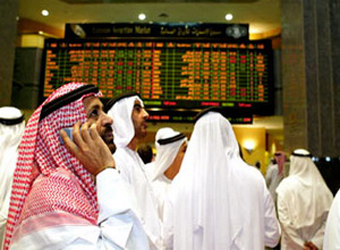Heavy flows of new money into Saudi Arabia’s stock market mean its bull run may just have begun, despite year-to-date gains by the main index of 13 percent, analysts say. Daily trading turnover on the Saudi exchange in February ran at between two and three times levels seen late last year. It jumped to SR16.1 billion ($4.3 billion) Tuesday, the highest level since January 2008 – before the global financial crisis damaged confidence in equities around the world.
Some of the rise in stock prices is due to a return of the short-term speculation that characterized the market before the crisis, traders believe. Insurance is one sector which may have become overheated; it is up 29 percent so far this year and analysts estimate its average price/earnings ratio at about 20 times this year’s earnings, high compared to other sectors and by historical standards.
Nevertheless, powerful forces appear to be behind the market’s rally. One is a shift of money out of other asset classes, especially real estate, into equities. Land prices in peripheral locations in big cities climbed about 10-20 percent over the past year, consultants Jones Lang Lasalle have estimated, but the rise may falter.
“People are getting suspicious about the real estate sector because of the huge jump in prices and are trying to get out…that’s when liquidity built up in the equity market,” said Faisal Al-Othman, portfolio manager at Riyadh-based Arab National Bank.
The consultative Shoura Council has proposed imposing a tax on undeveloped plots of land, local media reported in February; while it is not clear whether the government will adopt this proposal, the prospect may be helping to push money out of unproductive land speculation into equities.
Another factor continuing to push up stocks is the possibility that Saudi Arabia will open its equities market to direct investment by foreign institutions this year. The government has been considering the reform.
While some individual sectors may be overvalued, Al-Othman and others said it would be hard to claim this of the market as a whole. The main index is trading at about 13.5 times this year’s estimated earnings, he said, above other markets in the Gulf but below levels exceeding 15 that it reached in the past decade.
“Valuations as a whole remain reasonable even though some sectors, like cements, are trading at a premium to the market of about 40 percent,” said Farouk Miah, acting head of research at NCB Capital.
He added, “A lot of Saudi investors are getting cash-rich and volumes on the market are huge, but there is selling as well. It’s not purely speculative and it’s a good sign of the market’s maturity.”
The recent climb in global oil prices, and the possibility that Saudi crude output will expand to compensate for diminishing supply from Iran, mean that growth estimate may well be too conservative – and if so, analysts’ estimates for this year’s corporate earnings may be revised higher.



